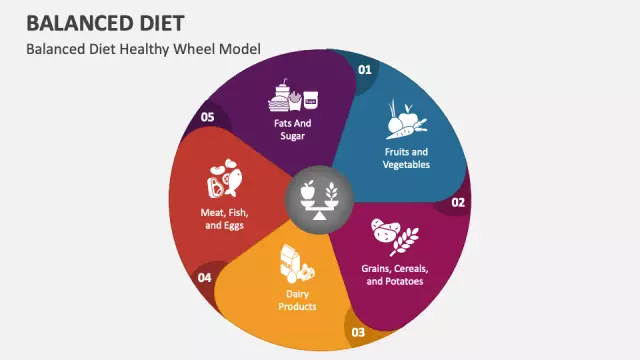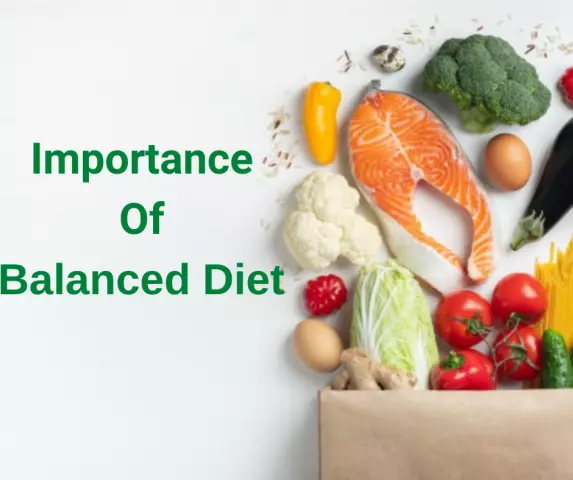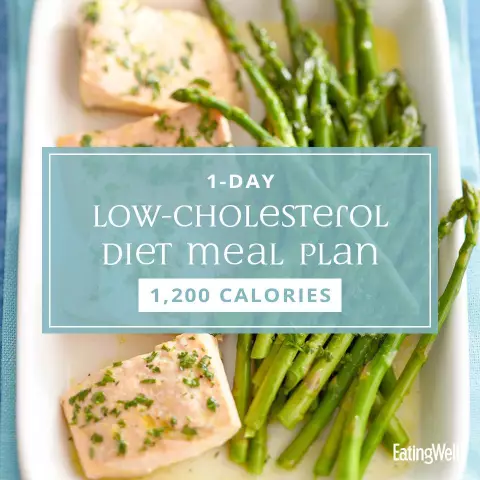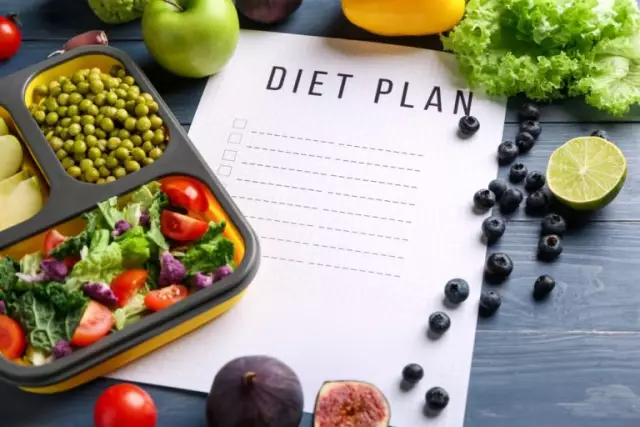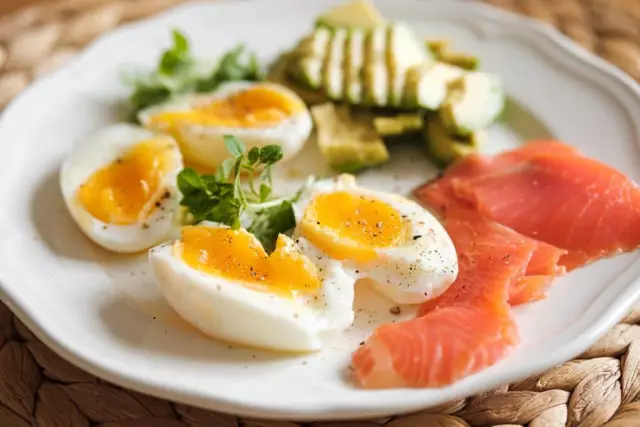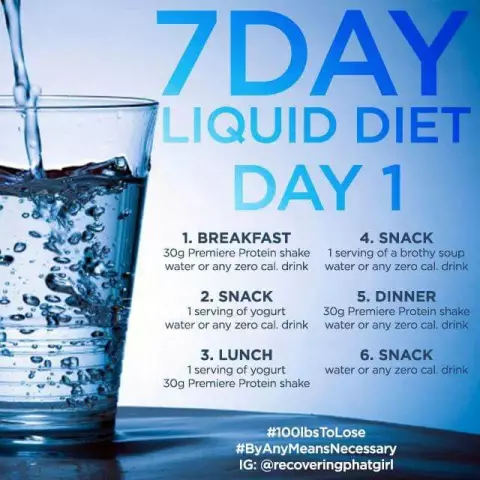- Author Rachel Wainwright wainwright@abchealthonline.com.
- Public 2023-12-15 07:39.
- Last modified 2025-11-02 20:14.
Balanced diet
A balanced diet is a diet in which the content of essential nutrients in the diet fully meets the needs of the body.
Differences between a balanced diet and other diets
Eating a balanced diet helps you shed those extra pounds without dieting. Almost any food is based on proteins, carbohydrates and fats. The diet is most often based on limiting the most high-calorie dietary components - fats and carbohydrates. However, they are also important for the health of the body, and they are present in the right amount in a balanced diet.
Unlike most diets, a balanced balanced diet allows you to do without excluding any nutrients from your diet.
A balanced diet for weight loss is much safer than various restrictive diets, because it is more physiological for our body.
In order to choose a special diet for weight loss, it is better for people with any health problems to first consult a doctor about the degree of its safety. The menu of a balanced diet for weight loss contains only products that are useful for all people, and natural weight loss occurs on the basis of a healthy diet.
On a balanced diet, weight is reduced by an average of 1 - 2 kg per week. Of course, compared to rigid diets, on a balanced diet, the rate of weight loss is very small, but the extra pounds are gone for good, and there are no cosmetic consequences of losing weight in the form of sagging skin and flabby muscles.
Principles of Forming a Balanced Diet
In a properly balanced diet, the content of carbohydrates is 40%, and proteins and fats are 30% each. This distribution of essential nutrients in a balanced diet allows the body to be provided with complete building materials and energy, without harming metabolism.
The amount of liquid drunk per day is of great importance, experts recommend adhering to the lower limit of the volume on a balanced diet of 1.5 liters. This amount will include the broth or soup eaten for lunch, as well as tea, coffee, compote or juice. It is desirable that non-carbonated mineral water constitutes up to half of the entire liquid of a balanced diet for weight loss. It is a healthy habit to drink a glass of cool mineral water immediately after sleep, to which you can add a little lemon juice.
On a balanced diet, you need to eat at approximately the same time, the regime promotes better digestion and absorption of nutrients. Portions should be small - it is better to eat often, but little by little. 2 hours before bedtime, it is recommended to drink a glass of kefir and not eat any more until morning. Between meals, you can drink mineral water, as well as tea or coffee without sugar.
It is better to replace bread in a balanced diet with dietetic bread or toast; preference should be given to products made from wholemeal flour. Animal fats are recommended to be replaced with vegetable oils - olive or sunflower oil, as well as nuts.
An approximate menu of a balanced diet for weight loss

This balanced diet approach assumes that the listed dishes will not be swapped. This procedure will allow you to more effectively deal with excess weight. An excellent addition to a balanced balanced diet will be daily physical education for half an hour at an average pace.
1 day:
- Breakfast - fresh fruit salad;
- Lunch - salad of fresh vegetables with butter, toast, cottage cheese, vegetable soup;
- Afternoon snack - kefir, apple, cottage cheese;
- Dinner - pancakes with apples.
2nd day:
- Breakfast - unsweetened tea with dietary bread;
- Lunch - boiled potatoes, vegetable salad dressed with olive oil;
- Afternoon snack - tea without sugar with milk and two teaspoons of jam;
- Dinner - boiled or stewed vegetables (not potatoes), meatballs, dried fruit compote.
Day 3 of a balanced diet:
- Breakfast - unsweetened coffee, bread with a thin layer of butter;
- Lunch - soup, tea without sugar with croutons;
- Afternoon snack - fresh fruits or vegetables (up to 300 - 350 g), mineral water without gases;
- Dinner - 200 g of cabbage (your choice - broccoli, cauliflower, Brussels sprouts), tomato or pomegranate juice.
Day 4:
- Breakfast - vegetable salad with olive oil, bread with a thin layer of butter;
- Lunch - 2 hard-boiled eggs, vegetable salad, tomato juice;
- Afternoon snack - tea with milk without sugar, 20 - 30 g of dark chocolate;
- Dinner - salad of herbs, hard cheese, bread.
Day 5:
- Breakfast - tea without sugar, bread with a thin layer of butter;
- Lunch - boiled potatoes, seasoned with olive oil, fresh vegetable salad;
- Afternoon snack - 150 g of a mixture of nuts (walnuts, almonds, hazel), dried apricots, raisins;
- Dinner - buckwheat or rice porridge (brown rice), seasoned with fried onions.
Day 6 of a balanced diet:
- Breakfast - salad of fresh carrots with olive oil, 50 g feta cheese;
- Lunch - boiled meat (choice - lean beef 300 g or chicken breast 500 g), vegetable salad, stewed cabbage;
- Afternoon snack - apples, bananas, orange;
- Dinner - stewed zucchini and tomatoes (can be replaced with eggplant), bread.
Day 7:
- Breakfast - coffee without sugar, bread with butter;
- Lunch - boiled potatoes with olive oil, vegetable salad;
- Afternoon snack - dried apricots, prunes, dried papaya and bananas, mineral water;
- Dinner - boiled or baked fish, green beans with garlic.
Fricker's Balanced Diet
The recipe for this diet comes from Europe, and its distinctive feature is that there is no special menu. A month of Fricker's diet allows you to lose 5-7 kg of excess weight.
This balanced diet consists of four dietary rules.
Protein-rich foods - fish, meat, cold snacks, eggs - are recommended to be consumed during lunch, be sure to combine them with vegetables. Finish each meal with a 200 g serving of fresh vegetables or fruits. From the diet of a balanced diet, it is necessary to remove all baked goods, sweets and sweets, and drink 1 tablespoon of olive oil in the morning and evening.
Found a mistake in the text? Select it and press Ctrl + Enter.

